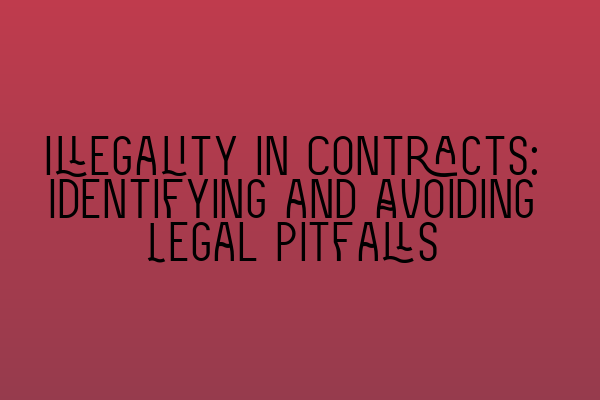Illegality in Contracts: Identifying and Avoiding Legal Pitfalls
Contracts are an integral part of every business transaction, providing parties with legally binding agreements that outline their rights and obligations. However, even the most seemingly straightforward contracts can be fraught with legal pitfalls, particularly when it comes to the issue of illegality.
Illegality refers to contracts that involve actions or considerations that are against the law, public policy, or considered morally unacceptable. Engaging in an illegal contract can have severe consequences, including rendering the contract void and unenforceable, exposing parties to legal liability, and damaging reputations. To protect your interests, it is essential to identify and avoid potential legal pitfalls related to illegality in contracts.
Common Forms of Illegality in Contracts
Illegality can take many forms, and it is crucial to be aware of common scenarios where contracts may become tainted:
- Fraudulent Activities: Contracts that involve fraudulent activities, such as misrepresentation, concealment of material facts, or intentional deceit, are illegal. It is essential to exercise due diligence and verify the accuracy of information provided by the other party to ensure the contract remains valid.
- Violation of Statutory Provisions: Some contracts may contravene specific statutes, regulations, or legal requirements. For example, entering into a contract to engage in an unlicensed trade or business activity may render the agreement illegal.
- Illegal Consideration: Contracts where the consideration offered is illegal, such as drugs, stolen goods, or other illicit items, are void and unenforceable. It is crucial to ensure that the consideration provided in a contract is lawful and compliant with applicable laws.
- Restraint of Trade: Contracts that contain unreasonable restraints on trade, such as non-compete clauses that are excessively broad or restrictive, may be considered illegal. It is essential to carefully review and tailor such provisions to avoid potential illegality.
Identifying Illegality in Contracts
Identifying illegality in contracts requires a comprehensive understanding of applicable laws and regulations. Here are some key strategies to help you navigate potential legal pitfalls:
- Research and Stay Informed: Stay up-to-date with changes in relevant laws, regulations, and legal precedents that may impact contract legality. Engage in regular legal research, follow legal news, and consult with legal professionals to ensure your contracts remain compliant.
- Conduct Due Diligence: Thoroughly investigate the other party’s background and activities to ensure there are no red flags or indications of potential illegality. Verify licenses, certifications, and other relevant information to protect your interests.
- Seek Legal Advice: When in doubt, consult with a qualified solicitor who specializes in contract law. They can review your contracts, identify potential illegality, and advise on necessary modifications or alternative courses of action.
Avoiding Legal Pitfalls
Prevention is always better than cure, and when it comes to illegality in contracts, taking proactive steps to avoid legal pitfalls is crucial. Consider the following strategies:
- Create Clear and Specific Contracts: Ensure that your contracts are drafted clearly, unambiguously, and in compliance with applicable laws. Clearly define the rights and obligations of all parties involved, leaving no room for interpretation that may lead to potential illegality.
- Include Severability Clauses: Include severability clauses in your contracts to minimize the risk of the entire agreement being deemed void due to a single illegal provision. Such clauses allow courts to sever unenforceable parts while preserving the overall validity of the contract.
- Be Aware of Unconscionable Contracts: Unconscionable contracts, those that are grossly unfair or oppressive, may be deemed illegal. Avoid taking advantage of a party’s vulnerability or power imbalance and ensure that your contracts are fair and equitable.
By employing these strategies, you can reduce the likelihood of encountering legal issues due to illegality in contracts, ensuring the enforceability and legitimacy of your agreements.
In conclusion, understanding and avoiding illegality in contracts is crucial for protecting your interests and ensuring the enforceability of your agreements. By staying informed, identifying potential pitfalls, and taking proactive steps to avoid illegality, you can safeguard your business and navigate the complexities of contract law successfully.
For more information related to contracts, business regulations, and legal qualifications, check out the following articles:
- LLC Formation Made Simple: Step-by-Step Guide for UK Entrepreneurs
- Business Regulations in the UK: A Comprehensive Overview
- SQE Workshops and Webinars: Accelerate Your Exam Preparation
- Delaware Corporate Law for UK Solicitors: Key Insights and Practices
- Demystifying the Solicitors Qualifying Examination Format
